Notice: Due to ongoing construction, 4 East is currently closed to the public. To obtain items located on 4 East, please place an online request for the item to be paged for you using the ‘Place Request’ button in the catalog. Please visit our Circulation FAQ page for assistance in using our catalog.
Notice: Due to ongoing construction, 4 East is currently closed to the public. To obtain items located on 4 East, please place an online request for the item to be paged for you using the ‘Place Request’ button in the catalog. Please visit our Circulation FAQ page for assistance in using our catalog.
Lab News
Showing 1 - 8 of 8 total news articles
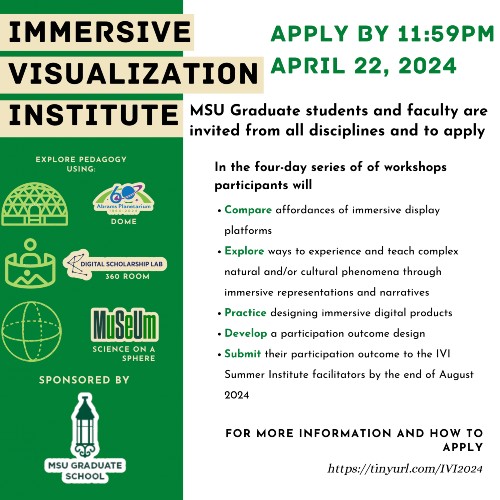
Apply for Immersive Visualization Institute 2024
March 20, 2024
Occurring June 3-6, 2024, this summer institute allows a cohort of faculty and graduate students to explore the pedagogic possibilities of three exciting large-scale immersive visualization display platforms available at MSU:The Abrams Planetarium360 Degree Panoramic Display Space in the Library’s Digital Scholarship Lab
Science On a Sphere at the MSU MuseumImmersive Visualization Institute (IVI) Graduate Fellows will learn about the affordances and limitations of each technology and how they are best suited for different types of visual representation. Participants will learn techniques for producing content for these displays and explore interdisciplinary ideas for capitalizing on one or more of the platforms. Participants are expected to produce a participation outcome using one of the technologies (e.g., teaching module, research study design, outreach program element, work of art) by August 18, 2024. The time commitment for producing a product varies, but participants should plan time during June-August for consultation with an IVI facilitator, draft, editing, and final version.Applicants are invited from across the entire university, and all disciplines and interdisciplinary perspectives are welcome. Graduate students may apply individually or with a faculty member mentor. Selection is competitive and limited to 10 graduate students. A $500.00 stipend is awarded to participating students. Students must be enrolled for Summer 2024 semester in order to participate. Please consult with your academic and financial aid advisors before applying to determine potential impacts related to your enrollment and receiving a stipend.In the workshops, participants will:Assess and compare the learning and other affordances of different immersive display platforms
Explore ways to experience and teach complex natural and/or cultural phenomena through immersive representations and narratives
Practice designing digital products for display using the three projection spaces
Develop a final productSubmit their product to the IVI Summer Institute facilitators by August 18, 2024
Participants will experience the capabilities of the Abrams Planetarium, the 360 immersive display space in the Digital Scholarship Lab at the Main Library, and Science On a Sphere at the MSU Museum to engage people in a wide range of phenomena, including immersion in macrocosmic, environmental, and social spaces as well as renditions of microcosmic phenomena.Apply Now for the Immersive Visualization InstituteCo-conveners include MSU Graduate School, Abrams Planetarium, MSU Libraries, and MSU Museum.Applications are due by 11:59 PM on Monday, April 22, 2024. Applicants will be notified of acceptance decisions by April 30, 2024. Please email questions to Carrie Wicker (Museum); Amanda Tickner or Justin Wadland (Libraries); or Shannon Schmoll (Planetarium).
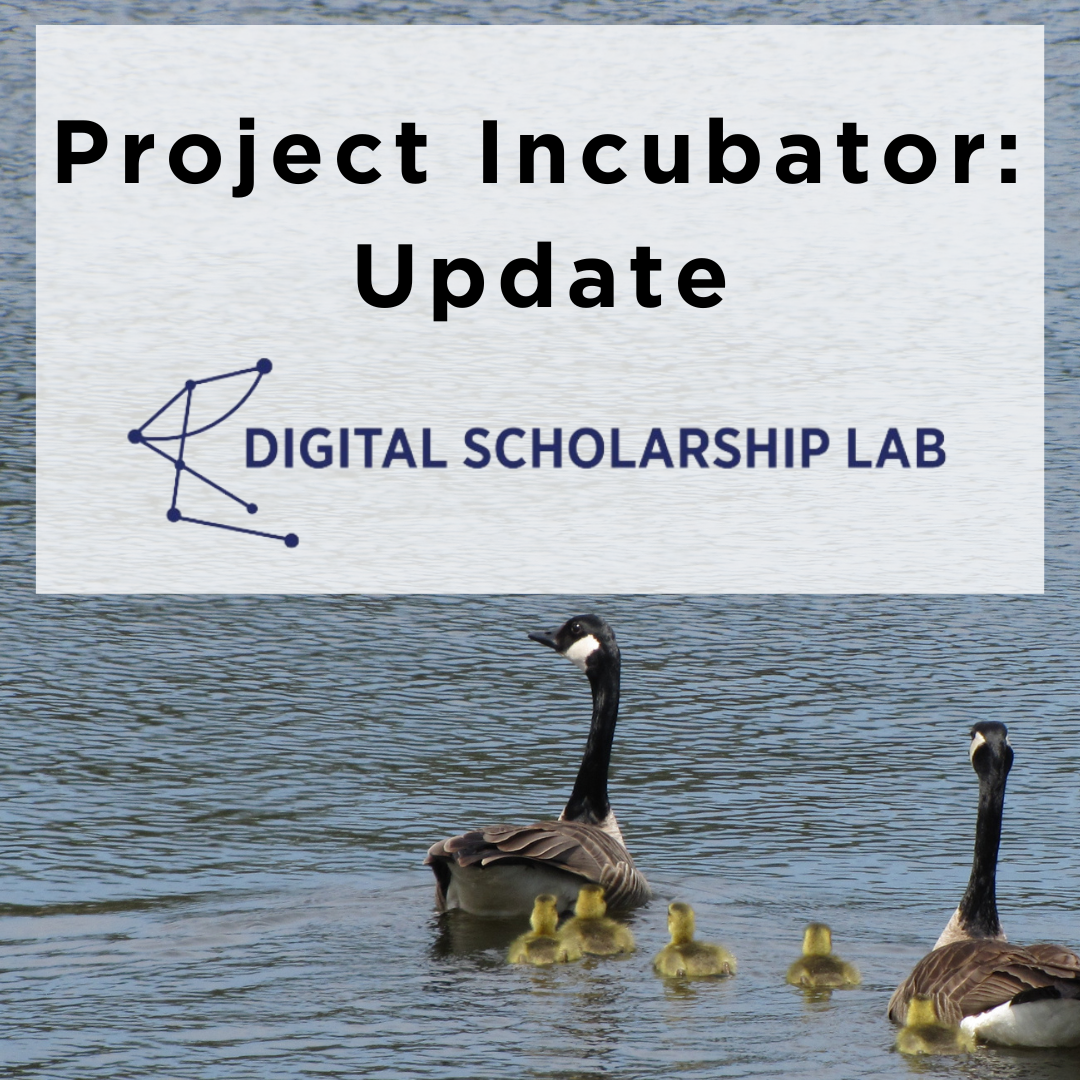
Project Incubator Update | Digital Scholarship Lab
March 06, 2024
Margaux Smith
Each year, the Digital Scholarship Lab takes on a cohort of MSU faculty, specialists, staff, and/or graduate students to participate in the Project Incubator. This program assists the group in exploring digital scholarship tools and methodologies to develop digital projects. Digital scholarship encompasses an array of potential research projects. The Project Incubator fosters academic, analytic, and even artistic presentations of data.This year's five participants began working and learning together in early October as a cohort and will continue to work through this semester in co-work sessions during Spring Semester. We’d like to take this opportunity to share a bit about the participants and their projects:Blaire Morseau: Potawatomi Star Knowledge, an astronomy presentation of native constellation mapping.Crystal VanKooten: Adventures, Friends, and Witness: The Alaskan Experience of Nurses Jacque Greeman, Annne Engbers, and Marge VanKooten, an oral history archive of the three women's experience in Alaska circa 1964.Katies Knowles: The Stratford Heritage Guide, a text based analysis of travel guides of Shakespeare's birthplace.Noah Kaye and Daniel Gutierrez: Seleukid Coins in the Collection of the Ödemiş Museum: A Linked Open Data Publication, a digital documentation of ancient coins for collection-based corpus.Siddharth Chandra: The Mass Killings in Indonesia 1965-1966, a mapped display of data demographics.Each of the participants of the Project Incubator will share, providing an overview of the project at a Showcase event at 4pm on April 18, 2024, which will be held in conjunction with the DH@MSU end of year celebration.
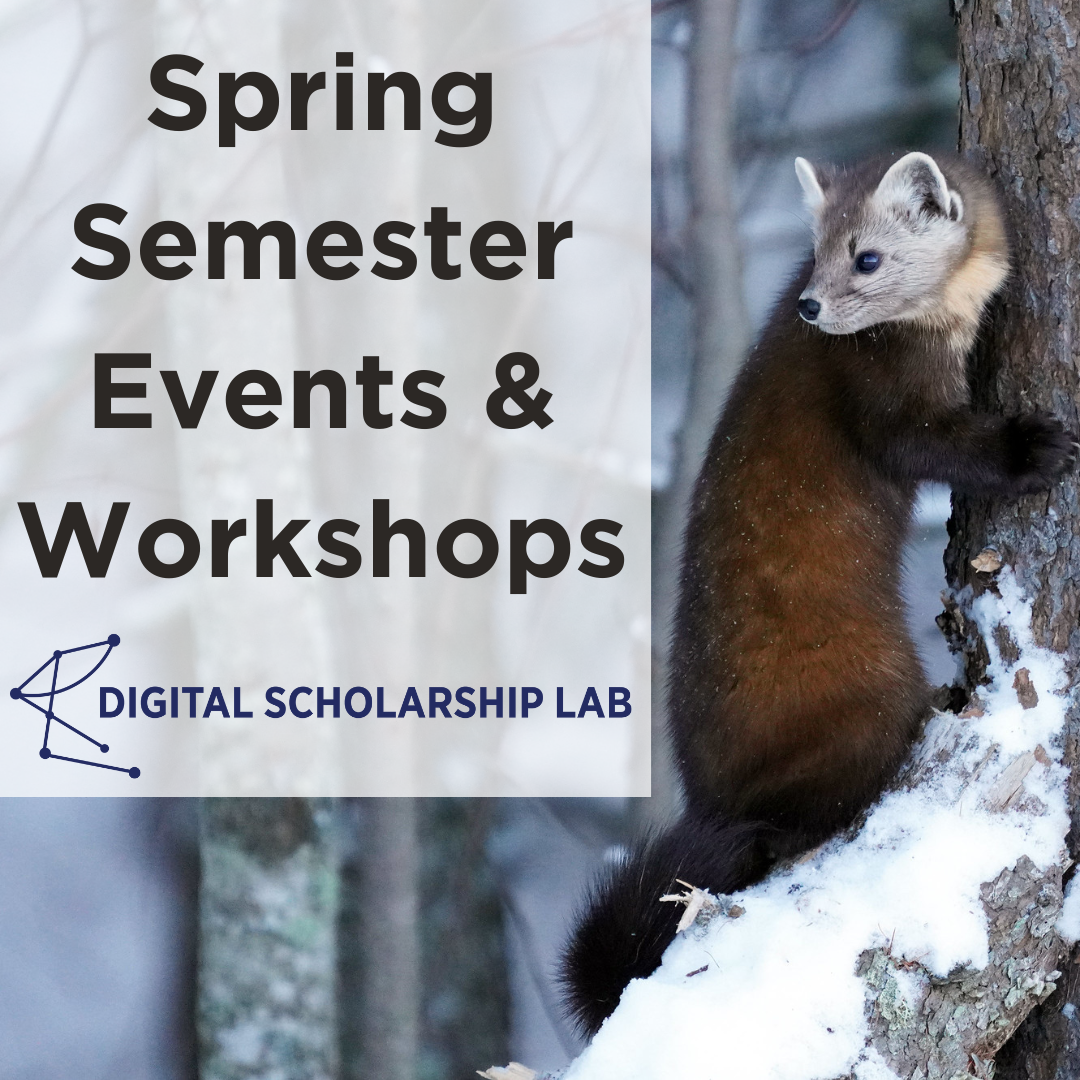
Spring Semester Events & Workshops | Digital Scholarship Lab
January 22, 2024
Justin Wadland
The Digital Scholarship Lab (DSL) at the Main Library has a great line up of events for Spring Semester, including drop-in sessions, workshops, events, and a conference. We're thrilled this to be participating in Love Data Week and Douglass Day this year and to be partnering with MSU's Institute for Cyber-enabled research to offer a Software Carpentry workshop.Some events are being delivered by DSL staff and other are hosted in partnership with other folks on campus. Most of these events appear in the MSU Libraries calendar, but we also wanted to provide a list to quickly scan. Some events require registration. Please click on the title for details.Open Hours for Emerging TechOpen Virtual Reality: Tuesdays and Thursdays, January 16 - April 18, 2024, 3:00pm - 6:00pmAnatomage Table Open Hours: Wednesdays, January 31, February 14, March 6, March 20, and April 10, 2024 2:00pm - 3:00pm Love Data Week / Douglass Day EventsDouglass Day Transcribe-a-thon: Help Transcribe the Letters of Frederick Douglass (Registration Recommended): Wednesday, February 14, 2024, 12:00pm - 3:00pmVisualizing Data in Flourish: Wednesday, February 14, 2024, 4:00pm - 5:30pmLearn Text Analysis with Python: a Case Study with Fredrick Douglass' Writings (Online / Registration Required): Friday, February 16, 2024, 12:00pm - 1:30pmGetting Started with... Creating Immersive & Instruction Experiences in ThingLink, Wednesday, February 7, 10:00am-11:30amVisualizing Data in Flourish: Wednesday, February 14, 2024, 4:00pm - 5:30pmElectronic Laboratory Notebooks: Tuesday, February 20, 2024, 10:00am - 11:00amXR and PedagogyTeach with XR: Workshop with Pizza (Registration Required): Monday, February 19, 11:00am-12:30pmSoftware CarpentrySoftware Carpentry: Programming with Python and More (Registration Required): Monday & Tuesday, February 26-27, 2024, 9:00am - 5:00pmGlobal DH ConferenceGlobal Digital Humanities Symposium (Registration Required): March 18-20 (virtual), March 22-23 (in-person)Photo credit: "American marten" by USFWS Midwest Region Flickr, PDM 1.0
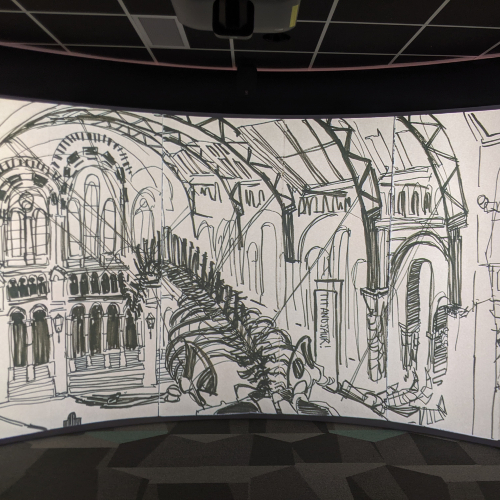
Graduate Arts Fellowship 2024 | Digital Scholarship Lab
December 14, 2023
Justin Wadland
Note: This fellowship is open to any graduate student in the College of Arts and Letters. Students graduating in May 2024 are not eligible for this Fellowship.The Digital Scholarship Lab at MSU Libraries offers services, spaces, and technologies that enhance and challenge how we do our work and how we share it. To encourage creative engagement with the unique resources of the DSL, we invite graduate students to experiment and develop new works of art. The DSL is a space with technology, but it is also a nexus of expertise, with librarians and library staff available to assist and collaborate with graduate student artists, whether in the physical space or through virtual conversations.The Fellow will receive a $5000 summer graduate fellowship funding award from the College of Arts and Letters.The DSL and the nearby the Hollander Makerspace have at your disposal:360 Visualization room (includes video/still/sound/CAD etc rendering)VR equipment (Oculus, HTC Vive, computers with graphics/processing to create VR/AR experiences)Computer stations with high processing power and specialized software (see list)360 cameras3D printers (PLA, ABS, and resin printers available)Soldering stationSewing machineLaser cutterCircuit cutterCNC MachineVacuum FormerWhiteboards and digital whiteboardsWebsite hosting space and supportAny graduate student artist interested in working in this space is welcome to apply, including but not limited to visual artists, musicians, multimedia artists, data designers, creative coders, AR explorers, game designers, storytellers, and researchers.Applications should include:A proposal (max 750 words; may also submit links to supplemental materials) that describes the artwork on which they plan to work during the fellowship period. The proposal should also articulate how the space and/or technology of the DSL will be used in the production and/or display of the artwork.A schedule/timeline of how the work will be completed over the course of the summer.A brief letter (½ -1 page) of recommendation from a faculty mentor discussing the project being proposed.Applications will be reviewed and evaluated on the following criteria:The project is reasonable / possible in the timeframe providedThe project has a clear plan for how the project will be completed during the summerThe project is a creative / exciting endeavor of artistic or scholarly worthThe project is helped by having access to DSL resourcesThe artist is committed to sharing work with the DSL and wider communityThe fellowship will take place throughout the summer and will begin with a kickoff meeting in early May, including the Fellow, DSL and CAL staff, and the Fellow’s advisor. The Fellow will have full access to the DSL during the summer, including office space, technology, and consulting support from librarians and library staff. Access to some technologies will be made available by appointment, via checkout, and/or remotely.The fellow is expected to work in-person regularly in the DSL. Midway through summer, the fellow will present a prototype of their in-process project with DSL staff and invited stakeholders to receive feedback and refine their work.By the end of September, the Fellow will conduct a 60-minute workshop, open to the community, on their use of a technology available in the DSL. The Fellowship will culminate in a public showing in the Digital Scholarship Lab of the artistic work by the end of September. This public showing will include an open house and artist’s talk. The Fellow is encouraged to deposit a copy of the artwork in the MSU Libraries’ collection for long-term access.
Apply for the Fellowship!
Applications are due by the end of the day Monday, February 5, 2024. Applications will be reviewed by the DSL Fellowship Committee. Notifications will go out by the end of February. 
Project Profile: Close Beside the Winding Cedar | Digital Scholarship Lab
October 18, 2023
Justin Wadland
Through his digital scholarship project “Close Beside the Winding Cedar,” Eric Tans, Science Coordinator and Environmental Sciences Librarian at MSU Libraries, has created a rich, multi-dimensional portrait of the river that flows through the history and campus of Michigan State University. Using ArcGIS StoryMaps, his project braids together interpretive maps, primary source materials, and narrative to investigate the complicated and at times conflicting attitudes toward the river.
Eric’s project is the culmination of a sabbatical spent research the history of the river and his participation in the 2022-2023 Digital Scholarship Lab Incubator, a yearlong opportunity to receive an introduction to digital scholarship practices and join a cohort of practitioners working on their own projects.
In this conversation, we highlight the ways the Project Incubator guided the design of his project.
Justin Wadland: When you describe your project to somebody who's never heard about it, what do you say?
Eric Tans: I describe it as an online exhibit, similar to a library exhibit, that demonstrates the history of the Red Cedar River and its relationship to MSU over time.
How did the project incubator help you with this project? Did you come in with the idea of creating this exhibit? How did it take shape?
I initially had the idea of creating an online product for my sabbatical research project on the history of the Red Cedar River. The project incubator was instrumental in helping me select the most appropriate software for my idea and providing numerous examples of other projects that used similar software or ideas. It also provided a lot of feedback on how everything should be organized and what it should look like. Additionally, I appreciated the lecture-based workshops and background information about digital scholarship, which helped me better understand the discipline.
Initially, I was stuck on how to display the mapping element of my story map and wanted to have one map that showed everything. I talked to Kate Topham [Digital Humanities Archivist in the College of Arts and Letters and lead for the Incubator last year], and she showed me a bunch of examples of other projects using StoryMaps. They all had multiple maps that were much more focused in what they were trying to show. I realized that having one big messy map was just not going to set my project up for success, so I followed the lead of the other projects and broke things out. Once that happened, then the organization of the rest of the information fell into place.
I spent some time recently reading through the whole project and looking at how you structured it. I like how it considers the river from all these different dimensions and then you have maps in that correspond to those dimensions.
Absolutely, that information would have been lost if I had tried to cram it all into one map. It would have been overwhelmed with details and elements being stuffed on top of each other.
What advice or lessons learned would you share with somebody who's working on a project like this?
I would say be open to following where the project takes you. Don’t be too prescriptive about what software to use or what it will ultimately end up looking like because that often reveals itself as you become more familiar with the tools and figure out how you want to piece it all together. The process for me was gradual. When it comes to using the tools, if it's something you've never used before, just get in there and start playing around with it and start adding stuff. The first draft of my project looked pretty different than what it ultimately ended up looking like.
Also, always revisit and revise after you have something put together. Getting someone to proofread your writing before it reaches a larger audience can be very helpful.
For more information:
View “Close Beside the Winding Cedar”
Article about project on MSU Libraries website
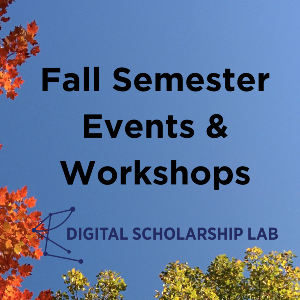
Fall Semester Events & Workshops | Digital Scholarship Lab
September 08, 2023
Justin Wadland
During Fall Semester, the Digital Scholarship Lab will be offering and hosting a lineup of events and trainings on digital scholarship, data, GIS, immersive visualization, and artificial intelligence for the MSU community.
Some events are being delivered by DSL and others we are hosting in partnership with other folks on campus. All of these events appear in the MSU Libraries calendar, but we also wanted to provide a list to quickly scan. Some events require registration. Please click on the title for details.
DSL Graduate Arts Fellowship at Main Library's Digital Scholarship Lab
Artist Talk: Adeline Newmann - Immersive Art in the Digital Scholarship Lab 360 Room: Tuesday, September 12, 4-6pm
Workshop: Step Into Your Sketchbook: Turning Accordion Books Into Immersive Art: Tuesday, September 19, 4-6pm
DSL Project Incubator Info Sessions
Digital Scholarship Lab Project Incubator Info Session (Hybrid): Thursday, September 14, 4-5pm & Monday, September 25, 12-1pm
Open hours for emerging tech
Open Virtual Reality, September 11 - December 8, Mondays: 9am-12pm; Fridays: 2-5pm
Anatomage Open Office Hours: September 13 - November 29, Wednesdays: 2-3pm
Data workshops
“Do I really Need a Data Management Plan?” Introduction to Data Management Plans for Research Proposals: Wednesday, September 27, 10-11am
Data Services available at MSU Libraries: Wednesday, October 18, 2023, 10-11am
GIS
(Offered by Maps Library; registration required)
Introduction to QGIS: Make a color shaded map (online): Wednesday, September 13, 2023, 4-5:30pm
Introduction to QGIS: Make a color shaded map (in person): Wednesday, September 20, 2023, 4-5:30pm
Introduction to ArcGIS Online (online only): Wednesday, October 25, 4-5:30pm
Midjourney AI Art Workshops
(Offered by MSU Museum CoLab; registration required)
Workshop 1: Introduction to Generative AI Art with Midjourney: Sunday, October 1, 1-3pm
Workshop 2: Exploring Styles and Genres in Generative AI Art: Sunday, October 15, 1-3pm
Workshop 3: Advanced Composition and Editing in Generative AI Art: Sunday, October 29, 1-3pm
Workshop 4: Exploratory Prompts and Critiques in Generative AI Art: Sunday, November 12, 1-3pm
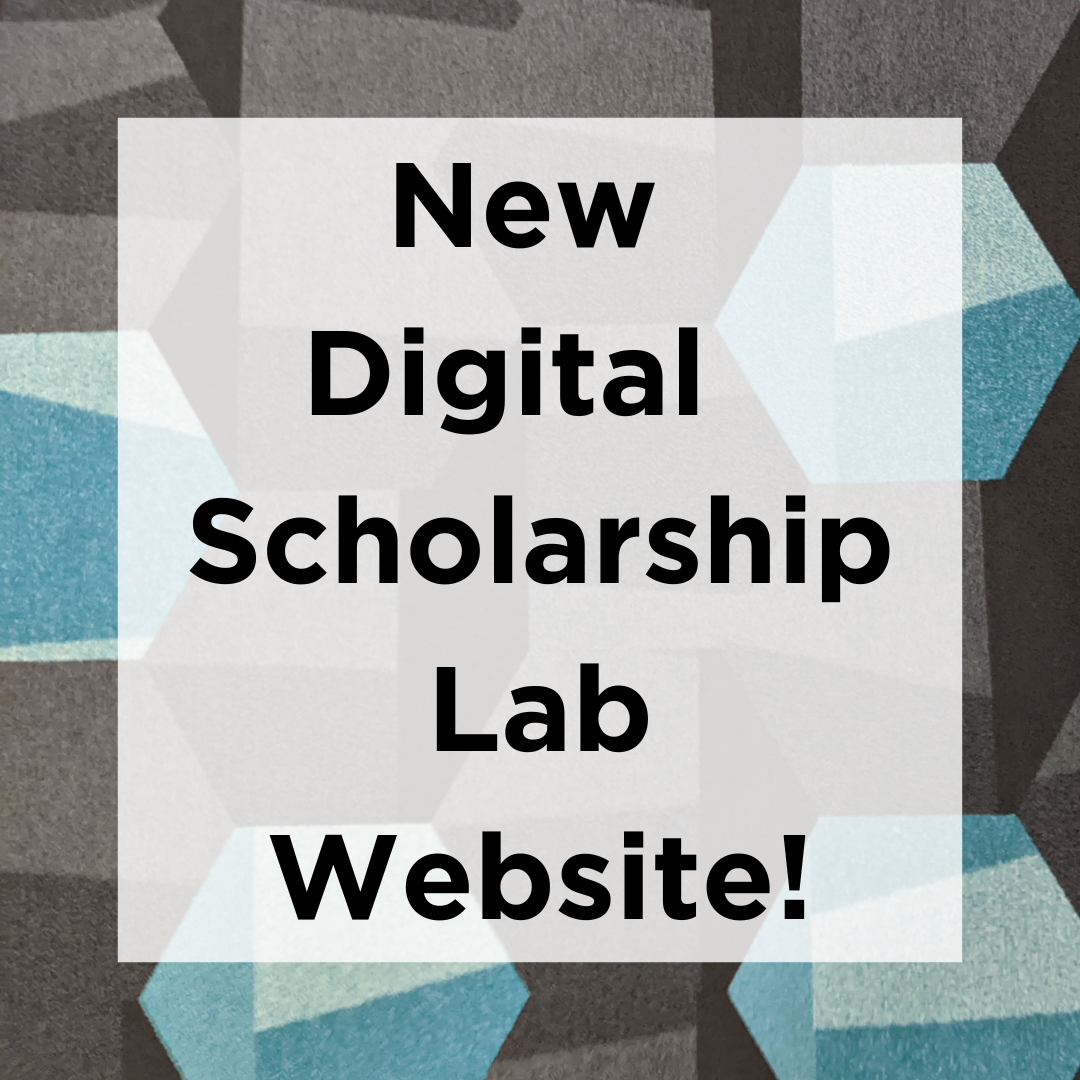
6 Good Things about the New DSL Website | Digital Scholarship Lab
September 01, 2023
Justin Wadland
When the MSU Libraries launched its new website in August, the Digital Scholarship Lab website also got a makeover. Or more accurately, we migrated it from its original Wordpress site to the MSU Libraries website.
As we did this work over the summer, we wanted to improve the site for our user community. Building on the past work, we kept a lot of the same pages, structures, and navigation, but made a few tweaks that we hope will help you get more quickly to the DSL services and information that you'd like to connect with.
Here's an overview of some of the changes:
1) Incorporation of tiles to high-use pages on homepage
Working with the MSU Libraries User Experience (UX) Team, these buttons were added to the homepage, identified by the frequent requests that we have for these services.
2) Redesigned spaces page
The DSL spaces are highly used, and one of our core services is responding to, managing, and consulting on our high-tech spaces. On the new spaces page, we have pathways that guide users to easily reserve group study rooms and learn more about high-tech spaces before reserving.
3) Consultation services and class support
Consulting with faculty and students on the use of technologies is another highly used service, and we developed a consultation service page and separate page that offers suggestions and guidance on bringing classes to the DSL.
4) Easily accessible list of software on the DSL computers
We frequently get questions about the software on the DSL computers. This version of the website has tile that provides quick access to an up-to-date list of specialized programs that we over on our 25 high-powered computers.
5) Incorporating news & events on our homepage
One of the main benefits of rolling our website into the MSUL website is that the events happening in and being hosted by the DSL can be featured on our homepage. In addition, we can have news stories that highlight the excellent work happening in, around, and through the DSL.
6) It is the work of many hands
The DSL Team met early in the summer to brainstorm changes we would like to see on the site. The MSU Libraries UX Team then supported us throughout the development process, while also migrating the entire MSU Libraries website. In spite of all they were juggling, the UX Team were very responsive as they designed the landing page, the tiles, site navigation, and other features. Without their assistance, it would have been impossible to migrate as quickly as we did.
We also thank the College of Arts and Letters for hosting the DSL website since 2018 and providing administrative support. The new website builds on this past work.
The website remains a work in progress and we intend to continue to improve it over the coming academic year, as we receive feedback from our user community. If you have any questions or comments about the website, feel free to contact us at DSLdesk[at]msu[dot]com.
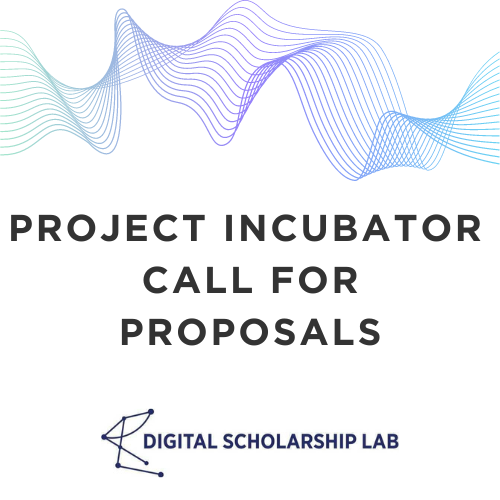
CFP for DSL Project Incubator 2023-2024 | Digital Scholarship Lab
August 21, 2023
Justin Wadland
The Digital Scholarship Lab is excited to open the Call for Proposals for the 2023-2024 Incubator Program. Proposals will be accepted through Thursday, September 28th, 2023. Apply now!
Do you have a project idea that you can't seem to get off the ground? Do you need access to specific technologies or consultations with experts? Are you past the prototype phase of your project and need help getting to the next step? Do you have an idea for a grant proposal for a digital scholarship project? Are you looking for a community that will give you feedback and support as your project grows? The Digital Scholarship Lab Incubator program supports transformative research projects at these critical junctures and shepherds them to the next phase.
Selected participants will form a cohort, learning with and from one another, as well as from librarians and experts from around the MSU campus. The Project Incubator begins with four months of workshops. During the fall semester selected project teams will meet bi-weekly, alternating between presentations from facilitators on planning, sustaining, and developing digital scholarship projects and workshop sessions where participants apply the material to their projects and get feedback from their peers. In the spring, the Incubator transitions to bi-weekly co-working sessions in which participants make progress on their goals and consult with digital scholarship experts.
The DSL Project Incubator Program is open to projects led by Michigan State University faculty, specialists, staff, and/or graduate students. Proposals from individuals or teams are equally welcome, and all team members are encouraged to participate in workshops and co-working sessions.
Benefits of the Incubator program include:
Guidance using a project lifecycle management framework that includes planning, defining roles on, delivering, and closing your project
Specific advice on applying workshop materials and concepts to your project
Access to the DSL Extension, including co-working rooms, high performance computers, and specialized equipment
Coordinated access to Library colleagues with relevant expertise: we will facilitate lab and library colleagues’ inclusion on project teams, subject to their availability and interest
Digital scholarship projects are more likely to be accepted if they meet the following criteria:
Early-stage or transitional/transitioning projects, especially those without grant funding, and/or projects with a completed prototype that need help moving to their next step
Projects that leverage digital tools and platforms available in the lab or across MSU and that also rely to a significant extent on lab staff or librarian expertise
While the Incubator hopes to meet in person in the Digital Scholarship Lab Extension as much as possible, we will work with all cohort members to ensure their safety and comfort during the Incubator.
Proposals must be submitted by the end of the day Thursday, September 28th, 2023. All applicants will be notified by Thursday, October 5th, 2023.
Apply Now
(Proposal form questions available here.)
Information Sessions
The Incubator team will host two information sessions to give potential applicants the opportunity to learn more about the program.
Thursday September 14th, 4:00-5:00pm
Monday, September 25th, 12:00-1:00pm
Info session will be held in hybrid format:
In-person: Digital Scholarship Lab Project Room J
Zoom link (MSU login required): https://msu.zoom.us/j/99856899444
Further questions about the Project Incubator may be directed to the facilitators, Justin Wadland (wadlandj[at]msu[dot]edu) and Kate Topham (tophamka[at]msu[dot]edu).
